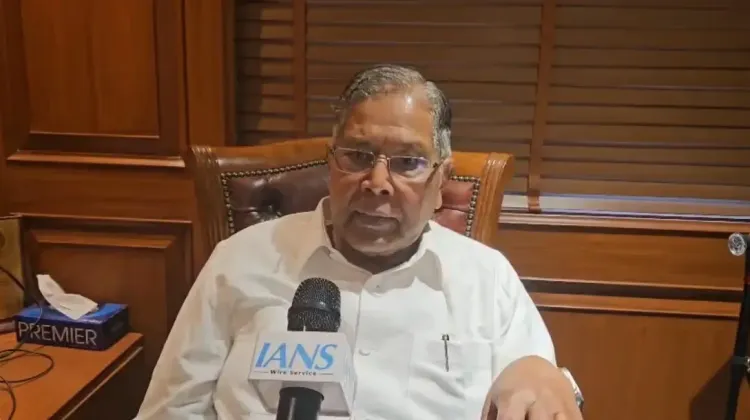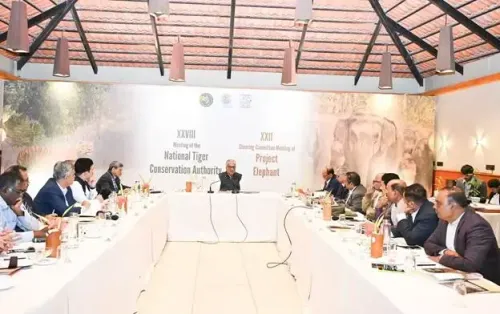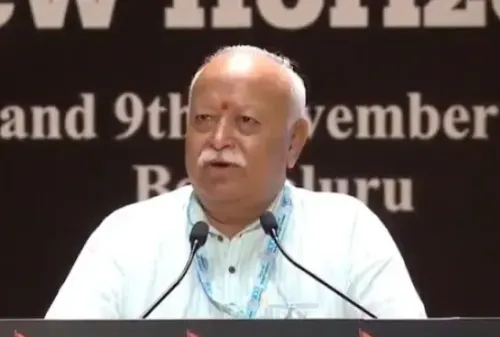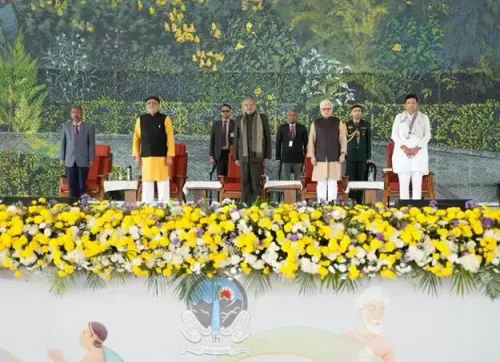K. Rahman Khan: Waqf Property is Divine and Non-Transferable

Synopsis
Key Takeaways
- Waqf properties are God's possession.
- Legislation should evolve with time.
- False narratives are being spread regarding property ownership.
- Minority rights are protected under the Constitution.
- Tribunals exist for resolving Waqf disputes.
Bengaluru, April 2 (NationPress) In the midst of the intense discussion regarding the Waqf Act amendment bill in the Lok Sabha, former Union Minister of Minority Affairs and Rajya Sabha Deputy Chairman K. Rahman Khan acknowledged the need for a shift in accordance with modern times, yet emphasized that the fundamental essence of Waqf property remains unaltered.
In an interview with IANS, Rahman Khan remarked that once a property is designated as Waqf, it transforms into God’s possession and cannot be transferred to another's name.
“There is a necessity for adjustments. I’m not arguing against modifications at this moment; however, this legislation is not static - it must evolve. During Indira Gandhi’s era, government properties were predominantly under government control, including Waqf properties. The key inquiry is: How do we ascertain whether a property qualifies as Waqf or not?” he elaborated.
He referenced observations from a Supreme Court ruling in Syed Ali and Others v/s Andhra Pradesh Waqf Board, asserting, ‘Once a Waqf, always a Waqf’.
“The Supreme Court’s ruling indicates that once a property is recognized as Waqf, it persists as Waqf indefinitely. If a property is announced as Waqf, it is owned by God. According to the principle, Waqf is non-transferable,” he affirmed.
The Congress leader further commented on the ongoing discussions surrounding the Waqf (Amendment) Bill in Parliament.
“Observe the current amendment discussions in Parliament. The entire discourse, the bill presented, and the manner in which the public is being misled - it’s an entirely erroneous narrative. I recently viewed the statement from my successor in the ministry, and how he is misleading the nation. This is a revengeful legislation. I term it revengeful because the BJP had previously endorsed these changes in various committees of the Joint Parliamentary Committee (JPC) completely. Now, they have twisted it, misrepresented it, and provided utterly false information to the populace. They are instilling fear among the public by suggesting that their land will be appropriated. This is regrettable and a false narrative. For example, they assert that even non-Muslims can contribute properties to the Waqf. This practice exists among Maharajas and various charitable organizations. If someone wishes to donate to a charity, how can it be prevented? That’s acceptable. Then they claim that even Parliament properties are Waqf properties. This assertion is entirely false,” he continued.
Rahman Khan further contended that the allegations concerning Parliament are completely inaccurate.
“Of the 123 properties that have been discussed for years, several committees were established. Ultimately, the Waqf Board identified specific properties, including prime sites like mosques. These properties are regulated by law. A hundred out of these 125 properties are either burial grounds, mosques, dargahs, or khanqahs. For two decades, these matters have been in the courts, with committees examining them. The final determination was made after comprehensive investigation, identifying 125 properties. The government allocated these 123 properties on a 100-year lease to the Waqf Board. Subsequently, someone filed a lawsuit, and the court ruled that if these were Waqf properties, they should be returned and denotified. This was conducted following due process. There is no drama here. Whatever the ministry claims in Parliament is a complete fabrication,” he stated.
Rahman Khan further asserted that there is no 'jungle law' as they are alleging.
“Furthermore, there is not a single provision that effectively serves the public interest. Article 25 of the Constitution guarantees the right to manage religious properties. The Constitution empowers minorities to uphold their properties. Now, the government intends to include two non-Muslims in the Waqf Board. This contradicts the law applicable to these properties, as they are private properties, not government assets. The law should respect customs under Articles 24 and 25. It is not constitutional. Thousands of properties have not undergone surveys. The law mandates a survey every decade. The new Waqf Bill proposes an independent survey commissioner to identify residual properties every ten years. They assert that 400-year-old documents are necessary, but properties have been utilized for 300-500 years. In the absence of a clear claim, the survey commissioner will make the decision. This is not 'jungle law' as they allege,” he added.
He further elucidated that there exists a tribunal to determine whether a property is Waqf or not.
“Moreover, there is a tribunal established to resolve disputes regarding the status of properties as Waqf or not. This is akin to other tribunals like the Income and Revenue tribunals. The government is once again misleading the public,” he emphasized.
The Congress leader concluded: “This is daylight robbery by the government. In a democracy, we must fight democratically. We have confidence in our judiciary and the populace. As B.R. Ambedkar predicted in 1930, the majority would dominate once the British departed. Today, that’s the reality. The government is enacting legislation based on majority rule, disregarding the stakeholders, particularly the Muslim community, who are the principal stakeholders. This legislation is not in their favor.”
Parliamentary Affairs Minister Kiren Rijiju presented the Waqf (Amendment) Bill in the Lok Sabha on Wednesday amid uproar from the Opposition.
Currently, an eight-hour discussion on the bill, subject to extension, is ongoing.
The Opposition claims that the Centre is 'bulldozing the legislation' as it asserts that it was not allotted sufficient time for amendments since the bill was introduced to the House.










